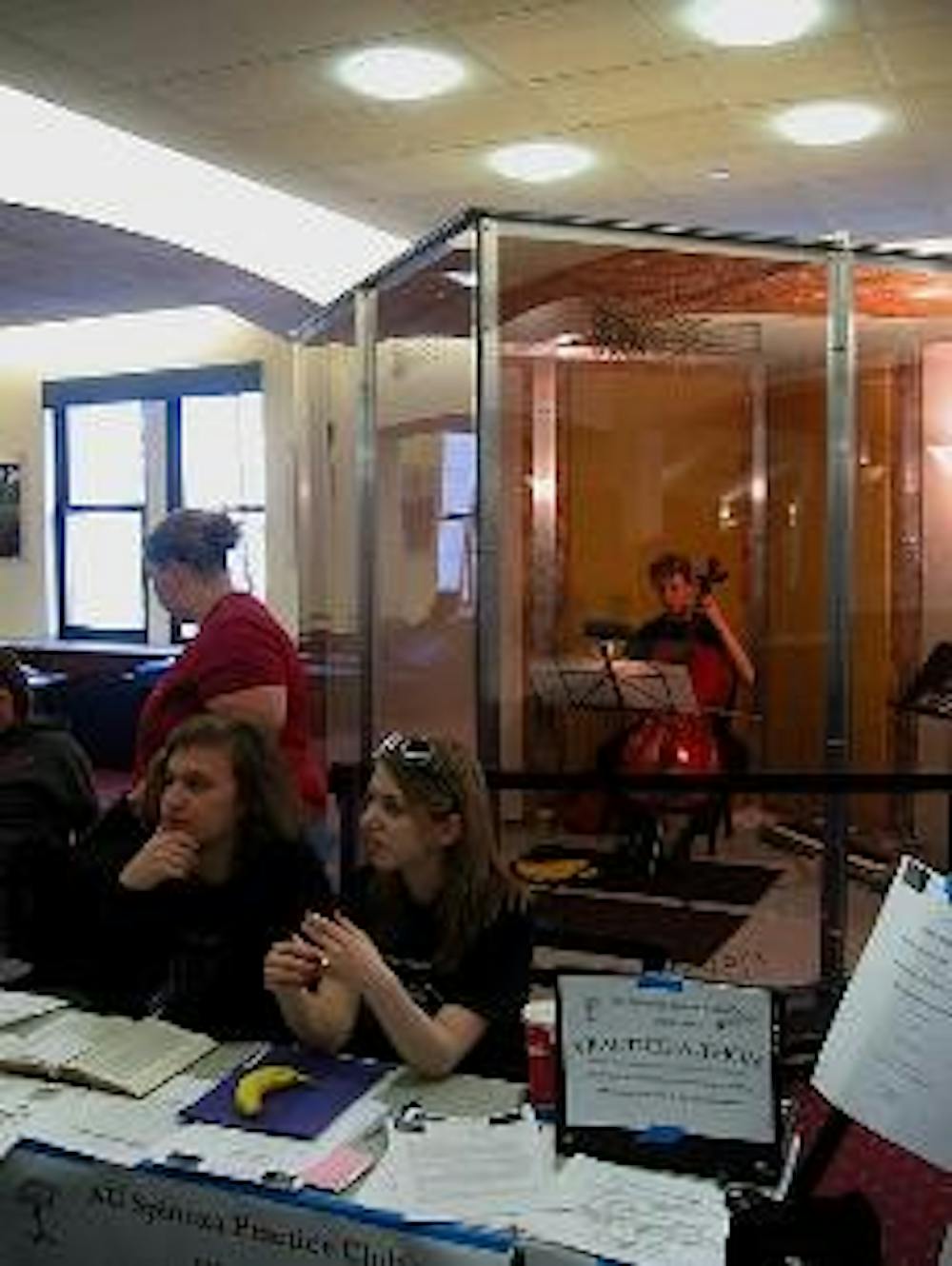Passing students saw it in Mary Graydon last Thursday and Friday. Many people's reaction to the giant cube was similar to Spencer Siegal's.
"What's going on?" Siegal, a freshman in the School of Public Affairs, asked.
Lucie Jaronowski, president of the Spinoza Practice Club and a freshman in SPA, explained that the reason a woman was playing the cello in a large, partly transparent cube was to raise money for a good cause.
Jaronowski and fellow club members were going to have someone in the cube practicing music for 24 hours in a first-ever practice-a-thon.
The cause was the Patricia M. Sitar Center for the Arts in Adams Morgan. The woman in the cube was Nancy Jo Snider, music program director in the Department of Performing Arts and faculty adviser to the Spinoza Practice Club.
When Snider brought students from the club to visit the center, which provides low-cost lessons in art, theater and music to children from low income families in the area, the AU students wanted to do something to help out.
"We wanted to do a little more than practice," Snider said.
The club, which Snider created with students last semester, meets every Sunday so that music majors and other AU students can support each other in instrumental practice. According to the group's site on Student Activities' Web site, the club takes its name from the 17th Century philosopher Baruch Spinoza.
According to the club's Web site, "As Spinoza believed virtue is its own reward, the Spinoza Practice Club believes that virtuosity is its own reward. ... The best way to achieve that is through consistent and productive practice."
Snider wanted to do something bold to attract attention to the cause. Not only that, she said she wanted to attract attention to the club and music in general.
"The problem with arts education is that people aren't exposed," Snider said. "It's a little inaccessible."
To get out of Katzen, Snider contacted Wenger, a supplier of educational music equipment, but the only thing Wenger wanted was a practice booth and the company wouldn't loan it to the group. Then Snider turned to her friend and cello student Steven Spurlock of Wnuk Spurlock Architecture.
"Nancy approached me with the notion of some sort of module," said Spurlock.
Thinking it might be a fun project, Spurlock talked to his staff, and they agreed and decided to construct something for the club for free.
"We initially did a design sketch and talked to some local builders and contractors and we were able to get most of the materials donated," Spurlock said.
T.W. Perry and James G. Davis Construction were among groups that donated time and supplies. Spurlock said his staff worked two 12-hour days on the project. The concept was a practice booth, about eight cubic feet of space that could be seen into and easily assembled and disassembled for multiple uses.
Stepping into the cube while Jaronowski played violin was an odd experience. Gavin Skal, a sophomore in SPA, jammed alongside her on guitar. The cube was equipped with an electric outlet, and luckily for the students on this warm spring day, a ventilation fan.
"It's like a terrarium but for musicians," Skal said.
It was a little jarring to have so many people looking in, but the musicians said they didn't mind being inside for an hour or two. In addition to the members of the club, members of the service fraternity Alpha Phi Omega helped staff tables to take donations.
By midday Thursday, it was going well. Passersby had donated as much as $20 on the spot. Jaronowski partly attributed this to the ease of donating with Eagle Bucks and the promise of a T-shirt with at least a $15 donation.
"It's really nice to donate and know that it's going to your immediate community," Jaronowski said.
Soon, Sitar Center founder Rhonda Buckley arrived with several students to take a turn in the module. Buckley described the center as providing a unique service to its students, almost all of them minorities living in Adams Morgan, Mount Pleasant or Columbia Heights. Although those neighborhoods are quickly gentrifying or have already, Buckley stressed the importance of staying in the neighborhood to serve those groups.
The cost factor is especially important. Where musical instruction can often cost upwards of $50 an hour, volunteers at the Sitar Center provide the students with 16 weeks of instruction for only $30.
At the end of the fundraiser, the club accumulated approximately $2,000 and is still accepting donations through next week. Anyone interested can contact Nancy Jo Snider at njcello@aol.com.





